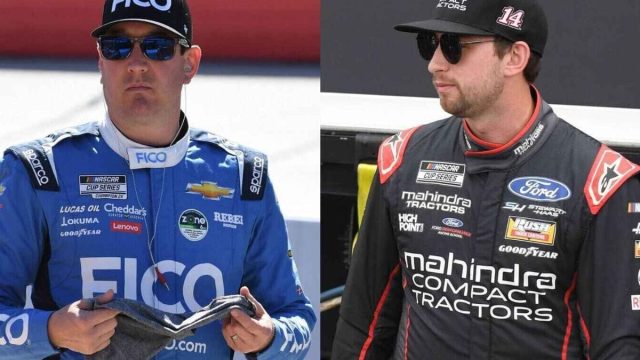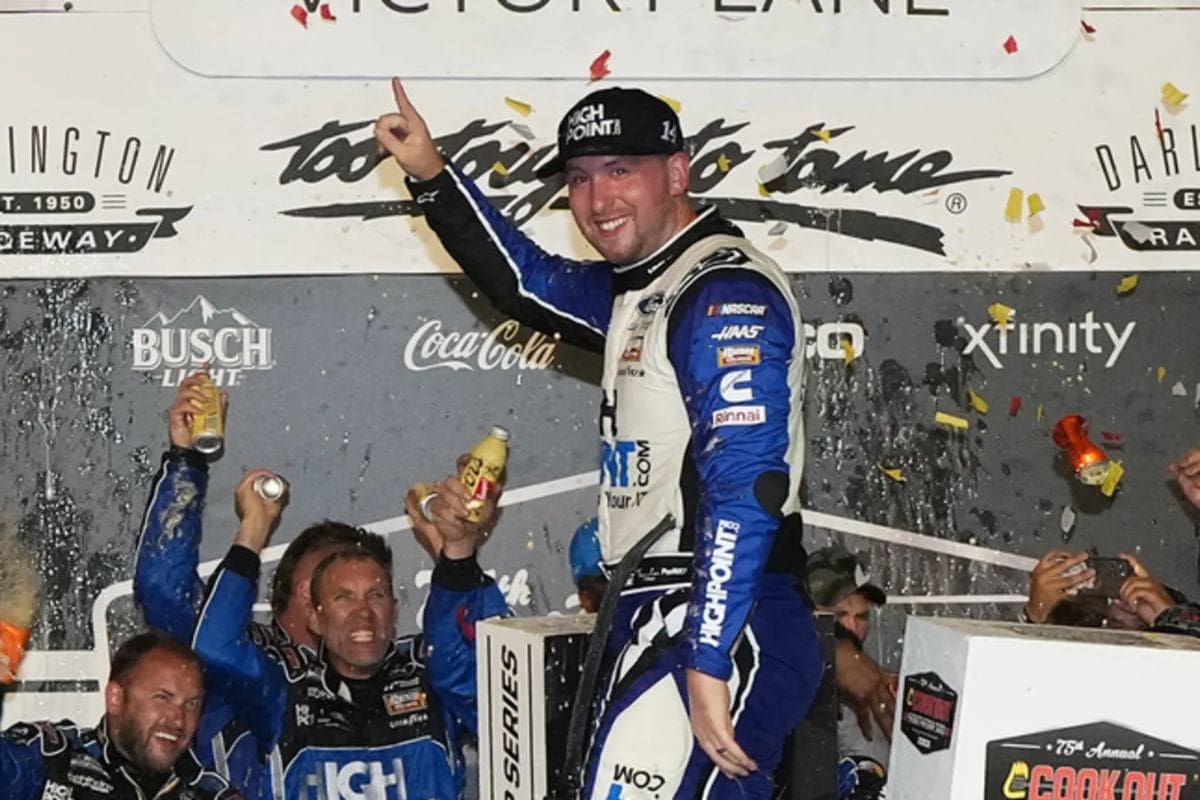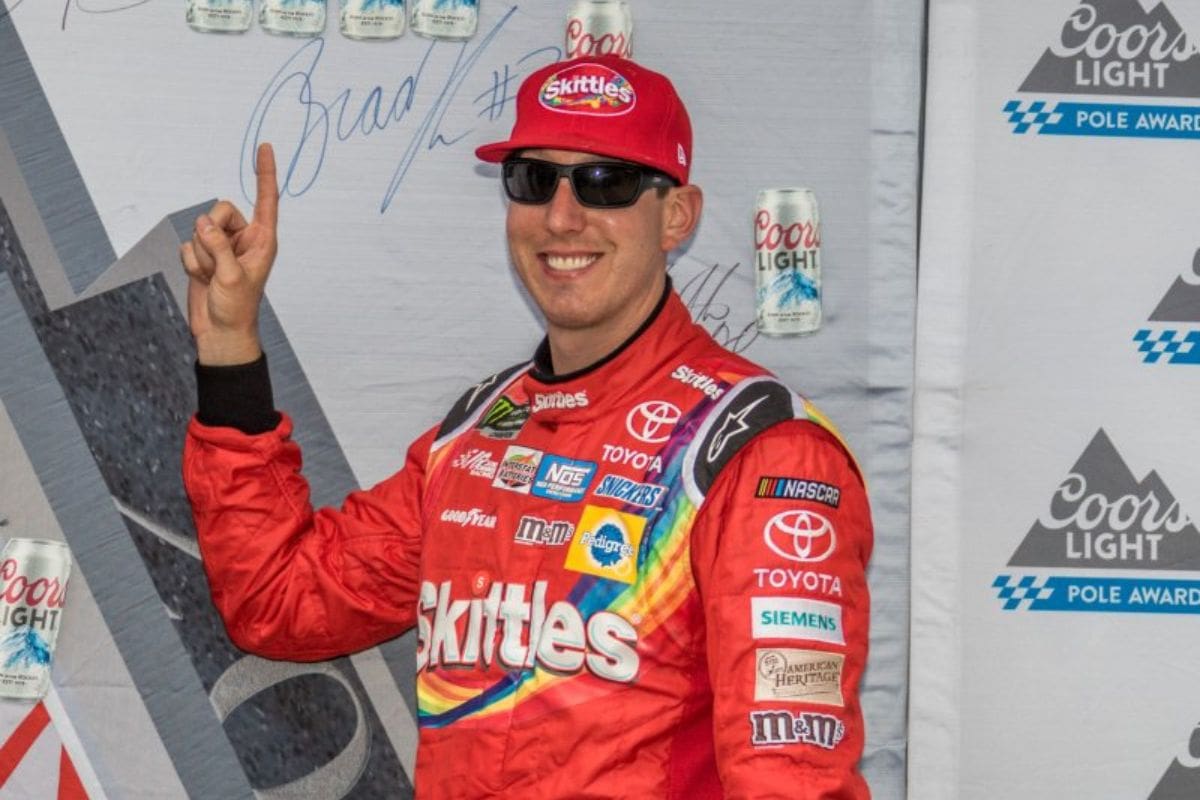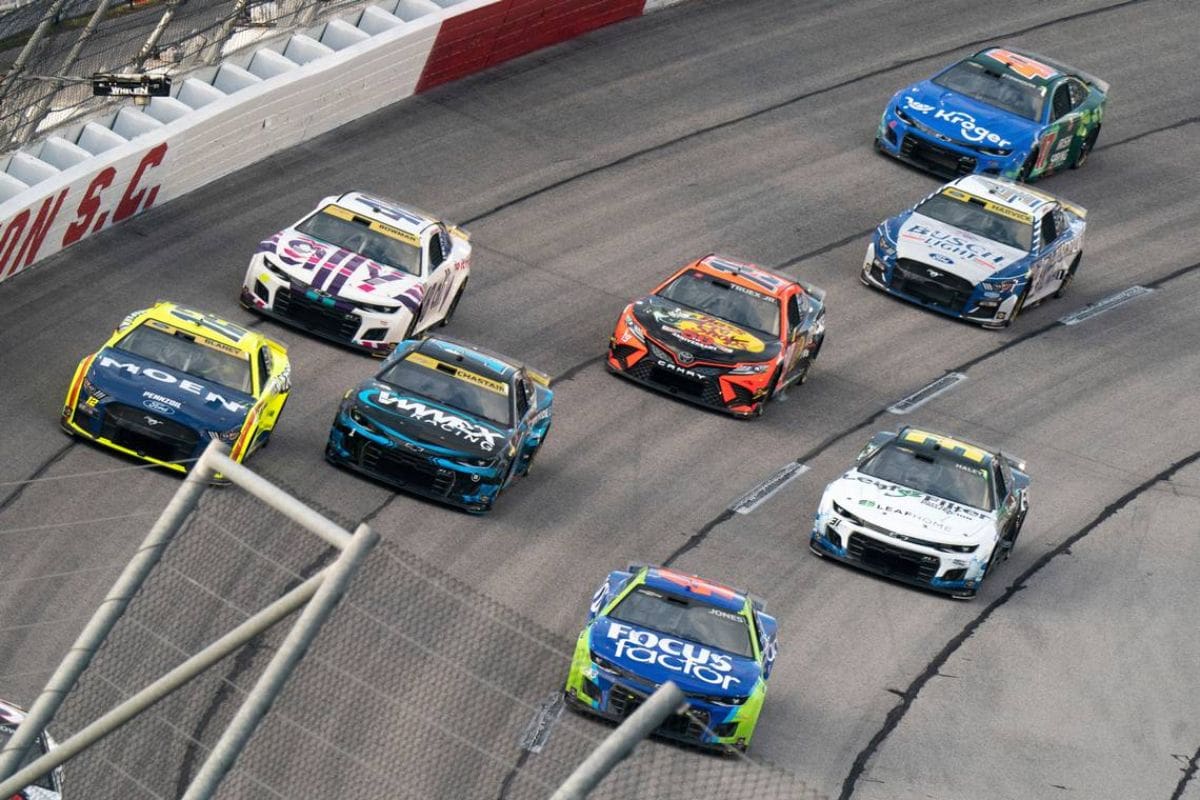Kevin Harvick Reacts to Kyle Busch’s Soft Response: Kyle Busch‘s reaction to Chase Briscoe‘s at Darlington revealed his own competitive frustrations and left Kevin Harvick visibly startled by the emotional undercurrents at play. This moment sums up the unpredictable essence of NASCAR, where even seasoned drivers like Busch can find themselves grappling with disappointment despite their skill. Harvick’s observations prompt a deeper examination of how race dynamics can shift in an instant, raising questions about adaptability and tactical foresight in the sport. What implications does this have for Busch’s playoff ambitions and his standing among peers?
Key Highlights
- Kyle Busch’s runner-up finish at Darlington raised questions about his adaptability and strategy during critical race moments.
- Kevin Harvick noted surprise at Busch’s reaction to Briscoe’s victory, indicating an unexpected shift in team dynamics.
- Busch’s inability to convert strong performances into wins has led to increased pressure as playoffs approach.
- Harvick emphasized tire management and track position as crucial elements that Busch struggled with during the race.
- The competitive nature of NASCAR, highlighted by Briscoe’s win, showcases the ongoing challenges Busch faces against evolving rivals.
Chase Briscoe’s Historic Victory at Darlington
Chase Briscoe’s victory at Darlington Raceway marked a notable milestone in his racing career, as he powered through the intense competition to secure a historic win. This achievement is not merely a personal accomplishment but a continuation of the legacy built by Stewart-Haas Racing (SHR) since its inception in 2008.
The organization has consistently delivered memorable moments that resonate deeply with NASCAR fans, epitomized by Tony Stewart’s 2011 playoff run and Kevin Harvick’s remarkable performances at iconic tracks.
Briscoe’s win at Darlington was a confirmation of his steadfast resolve amid fierce rivalry, particularly against seasoned competitors like Kyle Busch. The race unfolded with Briscoe exhibiting remarkable skill and a competitive spirit, outpacing Busch, who, despite his best efforts, found himself unable to secure the lead.
The significance of this victory is amplified by the context of the regular season finale. As the season came to a close, Briscoe’s achievement not only solidified his position within the NASCAR hierarchy but also demonstrated the resilience and tactical skill required to excel in this demanding sport.
His remarkable performance is a reminder that the path to success in NASCAR is often paved with challenges that test both skill and resolve, and Briscoe’s historic win will certainly be celebrated as a defining moment in his burgeoning career.
Kevin Harvick’s Observations on Kyle Busch’s Performance
How could a driver of Kyle Busch’s caliber finish so far behind in a race that showed his strengths? This question reverberated through the NASCAR community following the Southern 500, where Busch’s performance was overshadowed by Chase Briscoe’s remarkable victory.
Despite maintaining a steady P2 for much of the race, Busch’s inability to clinch the lead at a critical point has left observers, including Kevin Harvick, perplexed. Harvick, a seasoned veteran himself, expressed his surprise regarding Busch’s struggle to capitalize on a strong starting position.
During his analysis on ‘Kevin Harvick’s Happy Hour,’ he noted that Busch’s car performance seemed to wane as the race progressed. “I was a little surprised honestly at the very end that Kyle Busch didn’t get closer to him with the new tires,” Harvick remarked. This observation emphasizes the intricate relationship between tire management and track position in NASCAR, particularly in such situations.
I think that was just the difference in where Kyle’s car performance was to him once they got three or four laps on the tires. Those tires start to equalize a little, but the arrow and grip level starts to go down every lap that you run.” – Harvick
The Southern 500 exemplified that even elite drivers can falter when the dynamics of tire wear come into play. As the race unfolded, the grip and aerodynamics that initially supported Busch began to diminish, allowing Briscoe to assert his dominance in the closing laps.
For Busch, who has consistently been a formidable competitor, the failure to convert a strong performance into victory raises questions about adaptability and tactical execution in the face of evolving race conditions.
As Harvick aptly pointed out, the subtleties of racecraft can be the difference between success and disappointment, a reality Busch will certainly reflect on as he prepares for future challenges.
Kyle Busch’s Disappointment and Playoff Impact
Disappointment echoed through Kyle Busch’s camp following his consecutive runner-up finish, a clear reminder of the thin line between success and missed opportunity in NASCAR. Having previously finished third to Harrison Burton at Daytona International Speedway, Busch’s inability to convert strong performances into victories has considerable implications for his playoff aspirations.
The playoffs demand not only consistency but also the ability to seize pivotal moments; Busch’s recent results exemplify the stress he faces in this highly competitive landscape. The playoff picture has become increasingly unforgiving, with experienced drivers like Ross Chastain, Chris Buescher, and Bubba Wallace also on the outside looking in.
Busch’s back-to-back third-place finishes serve as a striking representation of the challenges he must navigate. While he remains a formidable competitor, the inability to claim wins in the regular season can dampen momentum and confidence heading into the playoffs.
Conversely, Chase Briscoe’s victorious achievement at Darlington Raceway infuses fresh energy into his season, showing the unpredictable nature of NASCAR. As Briscoe celebrates his resurgence, Busch must confront the reality that missed opportunities can swiftly shift the competitive balance.
The contrasting trajectories of these two drivers highlight the urgency for Busch to recalibrate his approach. With the stakes so high, it is vital for him to harness the lessons learned from these near-misses, ensuring that the next opportunity for victory does not slip away unnoticed.
Darlington Raceway’s Legacy for Stewart-Haas Racing
The rich legacy of Darlington Raceway for Stewart-Haas Racing (SHR) continues to unfold with Chase Briscoe’s recent victory, emphasizing the team’s historical strength at this iconic venue. This achievement not only cements Briscoe’s place among SHR’s elite but also adds to a storied history that has seen the team perform exceptionally well at the Southern 500. The unique characteristics of Darlington, often referred to as “The Lady in Black,” have consistently challenged drivers, making their successes all the more commendable.
Kevin Harvick’s dominance, particularly in 2014 when he led 238 laps en route to victory, highlights SHR’s competitive edge at this challenging track. His subsequent wins during the pandemic-altered 2020 season further solidified the team’s skill. As Briscoe’s win unfolds, it will be intriguing to see how this influences his path, potentially echoing the successes of his predecessors.
Other SHR Drivers at Darlington Raceway
Stewart-Haas Racing (SHR) has seen contributions from a variety of drivers at Darlington Raceway, each leaving their mark on this historic track. Remarkably, co-owner Tony Stewart has had a considerable impact, securing three place finishes during his illustrious career at this challenging venue, affectionately known as ‘The Lady in Black.
Stewart’s ability to navigate the track’s unique characteristics reflects both skill and tactical insight, qualities that continue to resonate within the SHR organization.
Ryan Newman, another key figure in SHR’s history, has also displayed his skill at Darlington. With an impressive average finish of 12.8, Newman exemplified consistency and resilience, factors that are critical in a race known for its demanding turns and abrasive surface.
More recently, Josh Berry has emerged as a promising talent, achieving his career-best finish in the Cup Series at Darlington, finishing behind Brad Keselowski and Ty Gibbs.
Berry’s ascent highlights the evolving dynamics within SHR, as fresh talent continues to make an impact on established platforms.
News in Brief: Kevin Harvick Reacts to Kyle Busch’s Soft Response
The unexpected nature of Chase Briscoe’s victory at Darlington serves as a poignant reminder of the inherent unpredictability within NASCAR. Kyle Busch’s reaction highlights the emotional toll that competitive racing exacts on drivers, particularly in consideration of playoff implications. Kevin Harvick’s observations emphasize the necessity for adaptability and tactical execution in the face of unforeseen challenges. As the legacy of Darlington Raceway continues to shape Stewart-Haas Racing, the resilience of drivers will remain vital for future successes.
ALSO READ: Samantha Busch’s Hopes for Kyle Busch’s Legacy Amid Playoff Disappointment



